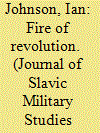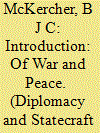|
|
|
Sort Order |
|
|
|
Items / Page
|
|
|
|
|
|
|
| Srl | Item |
| 1 |
ID:
137557


|
|
|
|
|
| Summary/Abstract |
In August, 1920, the fate of Europe hung in the balance. Bolshevik forces stood poised to take Warsaw, while Lenin contemplated the possibility of invading Germany. General von Seeckt in Germany considered renouncing the Treaty of Versailles, thus threatening a new world war. In France and Great Britain, senior leaders reluctantly and with great hesitation discussed military intervention in Eastern Europe. Using primary source material from American, British, German, and Polish archives, this study offers new conclusions about the landscape of post-war Europe through a counterfactual analysis of the Battle of Warsaw.
|
|
|
|
|
|
|
|
|
|
|
|
|
|
|
|
| 2 |
ID:
170288


|
|
|
|
|
| Summary/Abstract |
The Treaty of Versailles is one of the twentieth century’s most controversial international agreements; and British policy towards the settlement with defeated Germany equally so. British policy at the Peace Conference stemmed from war aims developed after 1914 – desultory because of unexpected total war. In this process after December 1916, Prime Minister David Lloyd George controlled policy-making and, by late 1918, had general aims involving German territorial losses, disarmament, and paying for the war. Despite distrusting Foreign Office professionals, Lloyd George and his Downing Street advisors at Paris relied on non-professional experts through informal networks below them. One was James Headlam-Morley about the future of Danzig; and several pre-war historians also contributed in a profound way, their experiences stimulating the establishment of diplomatic history as a field of academic research and the emergence of the nascent discipline of international relations. On bigger issues, like Anglo-American naval rivalry that emerged at the Conference, Lloyd George sparred with President Woodrow Wilson. And as only Lloyd George of the Big Four survived politically after the Conference, development of his ideas and policies during the war and after played a major role in post-war international politics. Some issues at Paris have not received needed attention like the restitution of cultural objects in German possession: the Koran of Caliph Othman and the Skull of Sultan Mkwawa. Finally, after the war, the Treaty’s impact on both Britain’s enemy, Germany, and its ally, France profoundly affected the European balance of power.
|
|
|
|
|
|
|
|
|
|
|
|
|
|
|
|
| 3 |
ID:
173223


|
|
|
|
|
| Summary/Abstract |
This study seeks to make a modest effort to look back at the marathon peacemaking ushered into by the Treaty of Versailles, during 1919–1922 periods, after Armistice was signed on 11 November 1918, bringing to an end the First World War. It has sought to place under scanner the said arduous process of peacemaking, resulting in an imposing corpus of five treaties comprising 1914 articles with Germany and its four other allies (Austria, Bulgaria, Hungary and Turkey). It presents an interesting role of the principal peacemakers therein along with the advent of the era of ‘organizing’ through the League of Nations and other entities such as International Labour Office and Permanent Court of International Justice. Now, at the distance of 101 years from the main event that heralded new milestones in international law and international relations, we have sought to make sense of it so as to deduce lessons to look ahead for our better world. Knowing well that alike human beings, any peacemaking cannot be flawless, it has been our endeavour to provide an objective understanding of the great peacemaking, its aftermath (1919–1939) and its relevance for the United Nations–led world order in the 21st century.
|
|
|
|
|
|
|
|
|
|
|
|
|
|
|
|
| 4 |
ID:
044332


|
|
|
|
|
| Edition |
3rd ed.
|
| Publication |
London, John Murray (Publishers), 1984.
|
| Description |
xiv, 487p.Pbk
|
| Standard Number |
0719540682
|
|
|
|
|
|
|
|
|
|
|
|
Copies: C:1/I:0,R:0,Q:0
Circulation
| Accession# | Call# | Current Location | Status | Policy | Location |
| 025234 | 909.82/WAT 025234 | Main | On Shelf | General | |
|
|
|
|
|
|
|
|
|